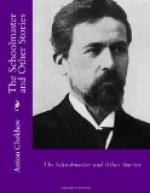“Have you any questions to ask?”
The assistant prosecutor shook his head negatively, without lifting his eyes from “Cain”; the counsel for the defence unexpectedly stirred and, clearing his throat, asked:
“Tell me, doctor, can you from the dimensions of the wound form any theory as to . . . as to the mental condition of the criminal? That is, I mean, does the extent of the injury justify the supposition that the accused was suffering from temporary aberration?”
The president raised his drowsy indifferent eyes to the counsel for the defence. The assistant prosecutor tore himself from “Cain,” and looked at the president. They merely looked, but there was no smile, no surprise, no perplexity-their faces expressed nothing.
“Perhaps,” the doctor hesitated, “if one considers the force with which . . . er—er—er . . . the criminal strikes the blow. . . . However, excuse me, I don’t quite understand your question. . . .”
The counsel for the defence did not get an answer to his question, and indeed he did not feel the necessity of one. It was clear even to himself that that question had strayed into his mind and found utterance simply through the effect of the stillness, the boredom, the whirring ventilator wheels.
When they had got rid of the doctor the court rose to examine the “material evidences.” The first thing examined was the full-skirted coat, upon the sleeve of which there was a dark brownish stain of blood. Harlamov on being questioned as to the origin of the stain stated:
“Three days before my old woman’s death Penkov bled his horse. I was there; I was helping to be sure, and . . . and got smeared with it. . . .”
“But Penkov has just given evidence that he does not remember that you were present at the bleeding. . . .”
“I can’t tell about that.”
“Sit down.”
They proceeded to examine the axe with which the old woman had been murdered.
“That’s not my axe,” the prisoner declared.
“Whose is it, then?”
“I can’t tell . . . I hadn’t an axe. . . .”
“A peasant can’t get on for a day without an axe. And your neighbour Ivan Timofeyitch, with whom you mended a sledge, has given evidence that it is your axe. . . .”
“I can’t say about that, but I swear before God (Harlamov held out his hand before him and spread out the fingers), before the living God. And I don’t remember how long it is since I did have an axe of my own. I did have one like that only a bit smaller, but my son Prohor lost it. Two years before he went into the army, he drove off to fetch wood, got drinking with the fellows, and lost it. . . .”
“Good, sit down.”
This systematic distrust and disinclination to hear him probably irritated and offended Harlamov. He blinked and red patches came out on his cheekbones.
“I swear in the sight of God,” he went on, craning his neck forward. “If you don’t believe me, be pleased to ask my son Prohor. Proshka, what did you do with the axe?” he suddenly asked in a rough voice, turning abruptly to the soldier escorting him. “Where is it?”




